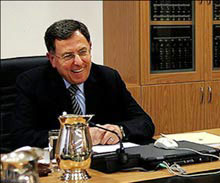| Tools: Save | Print | E-mail | Most Read |
| Lebanese Cabinet Approves Hariri Tribunal |
| Adjust font size: |
The Lebanese Government met Monday and unanimously approved a UN draft setting up an international tribunal to try suspects in the assassination of a former prime minister despite the objections of the president and the absence of six ministers who have resigned.
Hariri was killed along with 22 others in a massive suicide truck bombing in February 2005. The assassination sparked large anti-Syrian protests in Beirut, the Lebanese capital, and led to the withdrawal of Syrian troops from Lebanon, ending a 29-year military presence. Subsequent elections brought an anti-Syrian majority to power in parliament and the cabinet. The UN investigation has implicated top Syrian officials, but Syria has denied any role in the assassination. Saniora, whose anti-Syrian majority dominates the cabinet, convened the session Monday over President Emile Lahoud's objections and despite the resignations of six pro-Syrian ministers. Five of them, Shi'ite Muslims, quit in a dispute with the prime minister over their demand for more political share in decision-making. The resignations cast a shadow over the decision because Shi'ites were not represented in the cabinet, contravening a provision in Lebanon's constitution to ensure the distribution of political power among Christian and Muslim sects. Still, all 18 remaining ministers attending the meeting approved the United Nations document, and they defended the cabinet's decision as legal. "It is 100 percent constitutional," Information Minister Ghazi Aridi quoted Saniora as saying. Earlier Monday, Environment Minister Yaacoub Sarraf resigned, joining five Shi'ite Muslim ministers who on Saturday quit the half-Christian, half-Muslim cabinet. "I don't see myself belonging to any constitutional authority in which an entire sect is absent," Sarraf said in his letter of resignation to Saniora. "So I am tendering my resignation from your government." Sarraf, an independent who is allied with the pro-Syrian Lahoud and Hezbollah, submitted his resignation only hours before the cabinet met. Lahoud had warned that the Western-backed cabinet lost its legitimacy after the resignations of the Hezbollah and Amal ministers, citing Article Five of the constitution that states "all sects should be justly represented in the cabinet." Saniora swiftly rejected Sarraf's resignation as he did the other five. With Sarraf's resignation, a quarter of the 24-member cabinet had quit. His move makes it difficult for the cabinet to govern, but legally it still has the necessary two-thirds quorum to meet and make decisions. The UN final draft, which the government received from the UN last Friday, sets in motion the process of creating a "tribunal with an international character" as authorized by the UN Security Council to try suspects in the bombing that transformed Lebanon. President Lahoud had objected to some points in an earlier draft and declared it would not pass without his approval. Lahoud's opposition towards convening the cabinet to discuss the proposed tribunal sharpens the political divide in Lebanon between anti- and pro-Syrian forces. Lahoud and Hezbollah tilting towards Syria and Saniora and his allies opposing their powerful neighbor's influence in their country. (China Daily November 14, 2006) |
| Tools: Save | Print | E-mail | Most Read |
 |
| Related Stories |
|
Product Directory China Search |
Country Search Hot Buys |
